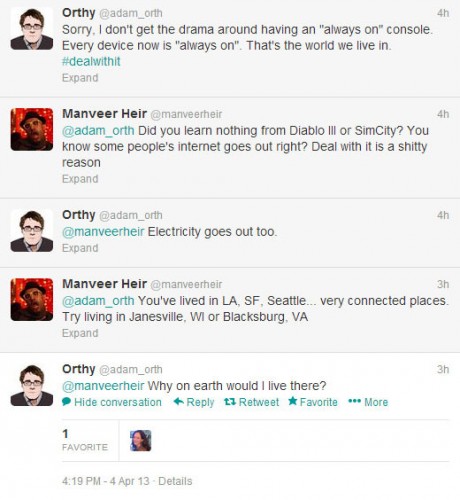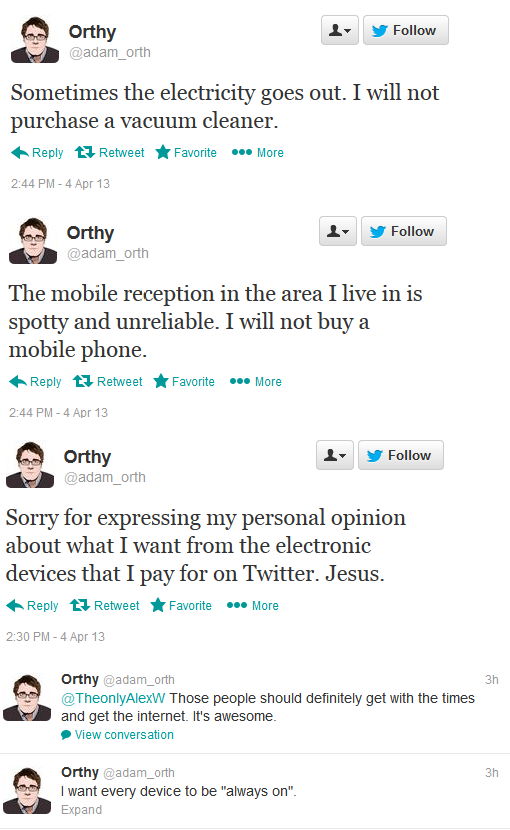Adam Orth, Creative Director at Microsoft Studios, made a mistake.
Orth recently had a public exchange over Twitter regarding an ‘always on’ consol. For those of you not hip to the relatively dense gaming community lingo, this essentially means you’ll require an active internet connection even to have a casual single player experience.
Things started out bad.

Then they got worse.

Then Orth curiously changed his Twitter account to private.
Why the controversy? ‘Always on’ content frustratingly complicates the traditional gaming experience, complications that usually arise from inefficient game developers and otherwise abysmal ISPs. It’s no fault of the actual gamer, the person actually spending money in this equation.
‘Always on’ content has a checkered past. This type of gameplay recently damned Diablo III – players had no access to the fastest-selling PC game ever due to internal server issues. Most recently, SimCity was demolished by critics for forcing always on gameplay – players similarly had no access to the game for weeks on end and were denied refunds.
It’s worth noting both these franchises made a name off providing an unparalleled single player experience. In the case of Adam Orth, he essentially conjured up a veritable storm of shit worthy of the X-Men by implying, “What’s the big deal?”
Of course, when you have a high profile position through one of the most polarizing companies in the US, everything you do and say is regarded with a certain level of scrutiny. Yet there’s little argument that utilizing a public platform such as Twitter carries the inherent risk of tarnishing your employer’s image – no matter the scale, regardless of where you are on the totem pole.
Orth’s remarks, later acknowledged to be in ‘jest’, were probably not remotely humorous from a Microsoft PR standpoint. The hardware developer was expected to unveil plans within weeks for the highly anticipated Xbox 360 successor. The timing of this incident couldn’t be worse.
Now a series of miscalculated tweets are potentially costing the company millions by alienating the majority of their fan base, driving them into the welcoming arms of competitors like Sony.
So if you’re the self-destructive type, saying stupid things on Twitter might actually prove more satisfying than literally shooting yourself in the foot. 140 characters or less is the fastest way to expand the already colossal hole you dug yourself – just ask my main man Chris Brown.
Orth essentially found a way to collide into an iceberg before the S.S. Microsoft ever set sail. It’s actually kind of impressive. And while Orth should and likely will be held accountable on some level, this type of backlash is truly unprecedented.
Seriously, fuck @adam_orth. Fire this clown. I love country living but our internet sucks.USED to love my XBox too. PS4 Baby, here I come.
— philip john aubin (@philipjaubin) April 5, 2013
The internet is largely unforgiving. Twitter is essentially a digital representation of the angry mob clad in overalls wielding pitchforks and torches. You can’t reason with them when the flood gates burst open.
And while Twitter is unique in that it allows us a direct line to virtually anyone of notoriety, such an open channel of communication occasionally proves disastrous for those in position to lose anything. Reserve a certain spotlight and say the wrong thing and suddenly an army consisting of far too many simpletons come calling for your head as if they’re entitled to it.
It’s swift justice, sure – but it also has a tendency to blow otherwise trivial incidents completely out of proportion.